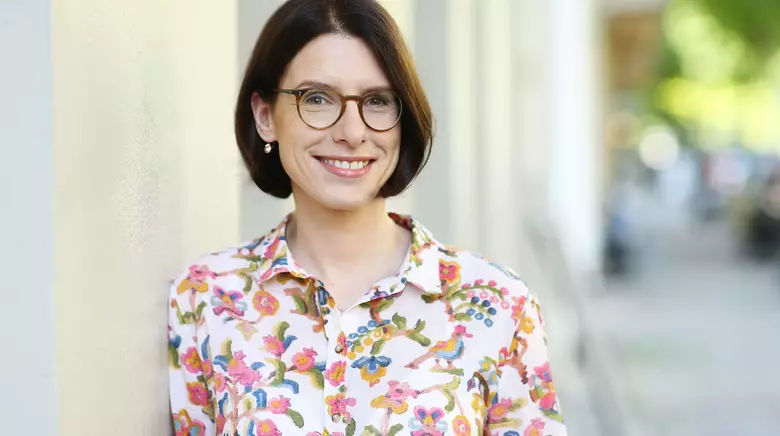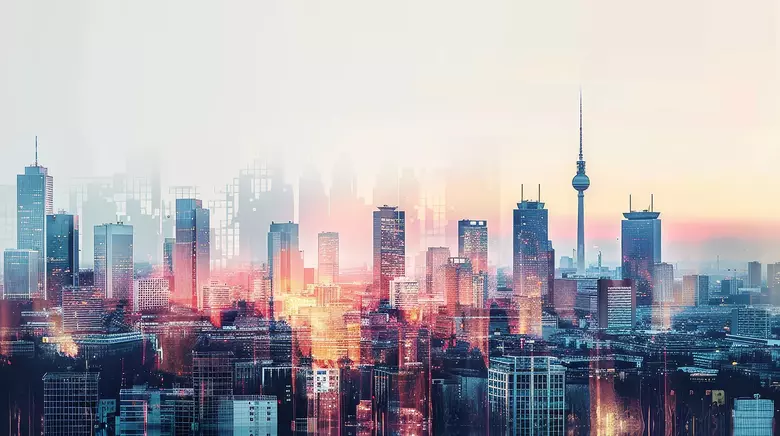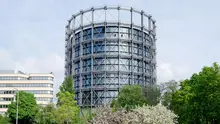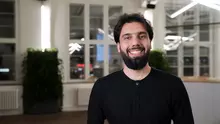Sustainable careers in Berlin: How the capital shapes your career path – an interview with Dr Julia Mühlhaus

Berlin is a growing metropolis that stands for tolerance, freedom and dynamism. And it’s precisely these traits that make the city an ideal place to develop sustainable careers. People are drawn here from all over the world because they want to make their career dreams come true and to benefit from Berlin’s openness.
In Berlin, all these people can actively shape their career paths, reflect and even combine multiple professional identities. The inspiring combination of cultural diversity and a broad spectrum of industries and companies creates ideal conditions for careers that are fulfilling and successful over the long term.
Dr Julia Mühlhaus, Head of Learning and Leadership Development at Charité Berlin hospital, career coach and researcher on “sustainable careers in cities” and “professional identities” has worked with her colleagues Prof. Svetlana Khapova and Prof. Onno Bouwmeester of the Vrije Universiteit Amsterdam to carry out a study on the theme “My city, my career: an investigation into the perception and creation of sustainable careers in Berlin”. What makes a career genuinely sustainable? And how can Berlin’s urban context contribute to keeping career paths lastingly productive and healthy?
Her research shows how important it is to find the right “fit” between a person’s own needs, values and talents and their actual career experiences in a city. Interviews were carried out with over 50 people from various professions and ages who came from Berlin, moved to Berlin or had left Berlin.
We met up with Dr Mühlhaus. In a unique interview, she gives rare insights into her research results. Find out how you can design a sustainable career and how Berlin as a city can shape and support it!
What is a sustainable career?
“Sustainable career” is an established term in career research, introduced by Ans De Vos, Beatrice Van der Heijden, Jos Akkermans and others. It’s a systematic and dynamic approach in which the interplay of an individual and their context are examined. One context might be the company, but another might be, for example, a city.
As the description “sustainable” implies, the third central dimension is time. So it’s about how, in the long run, a career needs to be characterised by happiness, health and productivity in order to be considered sustainable.
By happiness I mean an individual perception of career success and general satisfaction with life. Health relates to physical and mental health, and productivity to strong performance and employability over a long period.
Research by the colleagues previously mentioned has shown that it’s important to have what’s known as a “fit” between the individual’s actual career experiences and their specific needs, values, interests and talents. To achieve this, of course, it’s necessary to become aware of these aspects and, with appropriate proactivity, to design a career to be in harmonious with them.
What result did you come to in your study?
To examine sustainable careers in Berlin, I first wanted to understand how Berlin is described by the interview participants for context. It was notable that the interview participants had a very similar perception of Berlin and that they saw certain characteristics as typical of Berlin. For example, they said: “That’s something you only find in Berlin.”
They would describe things like: tolerance, openness and that it’s okay if you fail and that here you have the freedom to try things out.
They also value the presence of diverse communities, meetups, an informal atmosphere and that you can find people with similar interests – regardless of how specialised these might be. The relatively low cost of living was also mentioned, as well as the fact there were many startups and a lot of jobs in general. I interpreted these insights as the Eigenlogik (“intrinsic logic”) of Berlin. The intrinsic logic of cities is an approach from urban sociology, coined by scholars such as Martina Löw. Cities are considered to be “contexts of meaning” with a city-specific logic that influences people in their everyday lives, their thinking and their acting.
Interesting. Tell us more about the “intrinsic logic of Berlin”!
I see the “intrinsic logic of Berlin” not as an objective reality, but as subjective meanings that the interview participants ascribe to the city.
Based on Berlin’s intrinsic logic, some interview participants saw special possibilities around their careers, for example, the possibility to explore what they would like from their career and life – the opportunity to find their vocation and have a good work-life balance.
They then acted accordingly and, for example, changed organisations or careers or “tried out” different professional identities. We were also able to see that some people explicitly decided to work less. They wanted to have more free time, initiate new projects or launch their own business. With these people, the indicators happiness, health and productivity were clearly apparent in their statements. There seems to be a “fit” between their values, interests, talents and experiences in Berlin.
But there are also other interview participants who saw the intrinsic logic more as an obstacle for their career and had left Berlin or planned to leave the city. They had a stronger need for linear career paths, rapid progress in the form of promotions, including very good salary prospects. In comparison to other cities, e.g. Hamburg or Frankfurt, they saw this as less well-developed in Berlin.
Can you give examples of the subjective meanings and of how they affect careers?
Yes, as I say, some interview participants had the impression that “traditional linear careers” weren’t possible in Berlin and that you can’t earn as much money and therefore you have to leave the city.
There are certainly cities around the world that have a higher density of big companies, or cities where you can earn more. Nevertheless, my perception is that there very much are companies, e.g. big consulting firms or leading law firms in Berlin that enable this kind of career path and a high income – if those are personal career goals for you.
It would also be a mistake to overlook manufacturing, for example, of BMW motorbikes, and the regional locations ofTesla and Rolls-Royce. Moreover, Berlin is famous as global market leader in medical technology, for example Ottobock, W.O.M. World of Medicine and BIOTRONIK, as well as for giants in the field of tech and data that have big branch offices here – for example Google, SAP, Amazon and Meta.
One more example is that many interview participants still saw Berlin as fairly cheap and therefore perceived an opportunity to work less or to try things out in a relaxed way for the time being. But if you look at the official statistics, you see that rents are already in the upper-range for Germany, while the salaries are still relatively low.
But of course it depends on the city the interview participants are comparing Berlin with. One person, for example, came from New York and said that they could never have taken time off from a job there because they wouldn’t have known how to pay the rent. Here in Berlin, she felt less pressure and had tried out writing poetry.
What influence do the historical developments and unique lifestyles of Berlin have on sustainable careers?
Some interview participants named the well-known indicators of sustainable careers (happiness, health, productivity). This could primarily be attributed to the freedom they perceived in Berlin to find out how they imagined their careers, what their calling is or how they could achieve a certain kind of effectivity.
This went hand-in-hand with the possibility of trying out multiple companies, careers or self-employment – without being judged for this. They also stressed that the openness, tolerance and the relaxed style in the city encouraged them to explicitly take a lot of time for family, friends and interests alongside their professional activity or simply to enjoy the city they found so compelling to the full.
One perception held by many interview participants was that there’s a certain freedom in the air in Berlin.
Among others they attributed this to the fall of the Berlin Wall and the special freedom that, in their view, was already in the air back then and the possibilities that arose from it. This empowered them to be brave and reinvent themselves.
What recommendations do you have for people seeking a sustainable career?
Despite the established indicators, the criteria for a sustainable career are highly individual and can change over time. I find it very important to pause sometimes and ask yourself: What do I actually want from my career? What can I do? What interests me? What motivates me? And how does that fit with my context, the one I’m currently acting within, with my company, my profession, my city, my private milieu?
To design a career sustainably, a perceived “fit” is essential. Because careers can also be dynamic, it’s important to constantly stay on the ball and also to critically ask the question: Does everything (still) feel right?
As a career coach, I’m a sparring partner for my clients, who are engaging with precisely these questions and want to come up with options for action.
Where is Berlin situated in terms of sustainable careers in international comparison?
In my study I researched the interview participants’ subjective perceptions about sustainable careers. That means I can’t work out a ranking based on quantitative factors. But I can say that the criteria for a sustainable career can be very subjective and dynamic in a city.
While one study participant, for example, saw New York as too hectic and felt pressured by the perceived focus there on rapid career progress, in Berlin she found, for the first time, a space to “breathe” and explore, in her own time, what she could or wanted to do outside her career in marketing.
Another study participant, by contrast, found Berlin “lame” in terms of achievement and career development and wanted instead to live in what she called the “electrifying” New York, because that city and its inhabitants would drive her forwards.
In my assessment, it really comes down to the perception and the “fit” between individual and context. What am I looking for in a particular phase of my life in a city? What fits? What doesn’t fit? Why? What can I do?
Which means: A large number of interview participants perceived Berlin as a city for a sustainable career.
While other preferred cities like New York or Hamburg, because they saw a better “fit” there. It is and will remain individual.
What’s your perspective on Berlin’s development in terms of sustainable careers in the future?
As already mentioned, many interview participants said that they still found the cost of living in Berlin relatively cheap, which is why they felt confident, for example, to reduce their working hours so they could spend more time with their family, dare to go self-employed or take time completely off work.
One person said, for example, that she wouldn’t have dared to do that in Brussels because of the higher cost of living. If the cost of living continues to rise in Berlin, I can imagine that it might become seen as somewhat more risky to choose longer periods of “trying out” and discovering – unless you had built up significant savings.
What really impressed me about the interview participants, was that many of them had grappled with deeper questions: What fulfils me? What’s important to me? What do I want to achieve with my professional work? How can I go about doing that? Many of them told of projects undertaken with friends or their very specific community.
I think one special feature of Berlin is that its size means you can find like-minded people for almost anything you want to do. This is of course often an important basis for getting involved in new things and maybe even creating something as a collective. My impression is that Berlin is very diverse and as such offers great potential for shaping careers.








